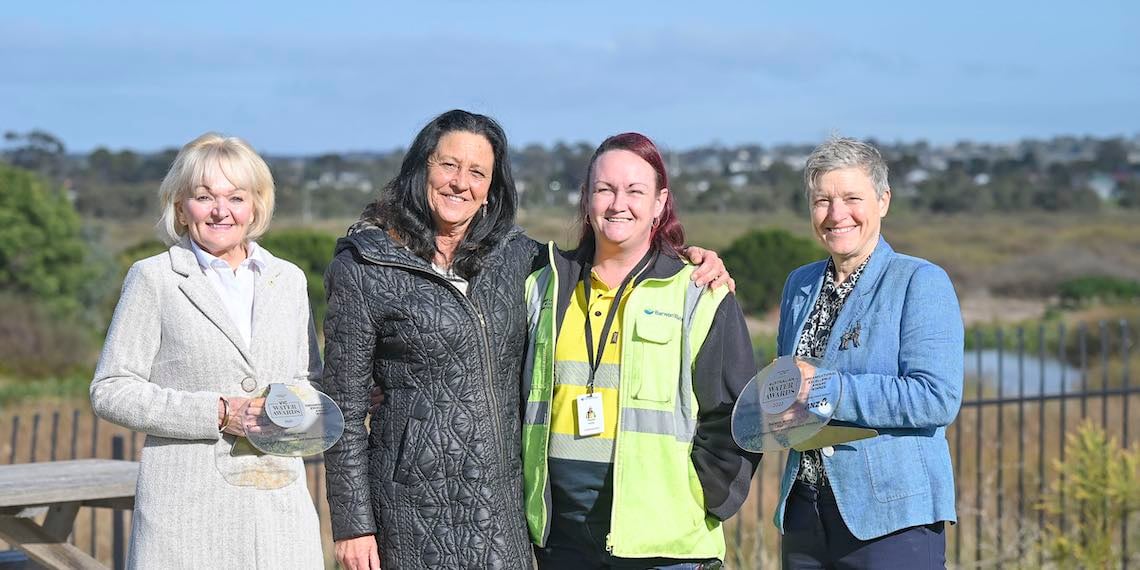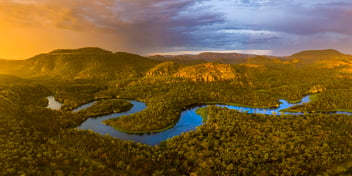How centring cultural safety transformed Barwon Water's Aboriginal employment strategy

When Barwon Water set about producing its Aboriginal Employment and Retention Strategy, it put holistic wellbeing and cultural safety at the centre of its approach.
As a result, the Geelong-area water utility has gone from having no identified First Nations employees to eight in a space of five years.
The success of the strategy was recognised at the Australian Water Awards this past May in the Organisational Excellence category, where it was commended for providing “the foundations for creating and delivering culturally appropriate, respectful and meaningful outcomes for Aboriginal employees”.
“Barwon Water's vision for reconciliation is for all peoples to stand unified in an inclusive and connected community,” said David McKinnis, Barwon Water’s Acting Manager of Sustainability and Healthy Country. “This Aboriginal Employment and Retention Strategy was a key component of our reconciliation action plan.”
McKinnis attributes Barwon Water’s success to the way it brought its Aboriginal Employment and Retention Strategy together with the utility’s corporate strategy and its reconciliation action plan (RAP).
“It was really important that we did a lot of work around making sure that our business was ready for First Nations people to come in and be successful,” he said.
“That was a program of education for our staff and … when you first walk in our building, we've got acknowledgements of country, we've got representation of flags, we've got artwork.”
Some of these are simple actions, McKinnis acknowledged.
“But sometimes simple, smaller steps can make a big difference. It's all about creating that culturally safe environment for when we do get First Nations employees into our business.”
A welcoming environment
Hayley Jones, a Tasmanian Aboriginal woman from the Toogee people from the south-west of the state works in Barwon Water’s Land Management team. She praises the environment that Barwon Water has created for Aboriginal employees.
“I love Barwon Water. They’ve been really good to me throughout my traineeship and offered me lots of different opportunities. Across all the teams I’ve worked in, I’ve enjoyed a welcoming, culturally safe environment. When I finished my traineeship they didn’t want to lose me and now I’m working with the Land Management team," she said.
“They always make time for my work with Barwon Water’s Stretch RAP working group, which has been a really positive experience. As an Indigenous woman who is part of the Barwon Water workforce, the whole group made me feel welcome and appreciated my input.”
For Barwon Water, a strategy targeted at employment for First Nations people begins during the recruiting stage, when the utility advertises vacancies on targeted job boards, as well as in the Aboriginal and Torres Strait Islander news outlet National Indigenous Times. It also works with an Aboriginal consultancy in the development and realisation of its recruitment strategy.
“Once they were confident in what we were doing, they were comfortable to work with us to build this employment retention strategy," McKinnis said.
"And they said they wouldn't have done that if they didn't think that our organisation was a safe place for First Nations People to come and work at.”
Another approach the organisation takes is via its involvement in a Career Tracker scholarship aimed at early career professionals.
“That's where we have First Nations people who are doing a degree at university, and throughout that degree, they're looking for work experience during their summer school holidays,” McKinnis said.
“We've also got an employee assistance program specifically for Aboriginal and Torres Strait Islander employees, and we've been looking to remove barriers to employment through the language we use in our job ads and policies and interview panels. And we ensure that, anyone who identifies as a First Nations person, we provide them the offer to have another First Nations person as a support during the interview process.”
Getting staff on board
The utility also ensures that Aboriginal cultural values are part of its employee onboarding process.
“That's for all staff,” McKinnis said. “Everyone who starts at Barwon Water does a connection to Country training and an excursion with a Traditional Owner group.
“That also includes doing … an E-learn. It's an electronic learning beforehand, which we developed with the Traditional Owner groups so that the people coming in to do those connection to country training and excursions don't come in completely fresh. They feel like they've been able to go through the E-learn and get some of the basics.”
The utility also runs cultural awareness workshop training for work groups who have employees who identify as First Nations people.
“So, prior to any First Nations person coming into a group at Barwon Water, we will run a session with that group to make sure that we are creating a culturally safe environment,” McKinnis explained.
The Aboriginal Employment and Retention Strategy was created as part of Barwon Water’s Innovate RAP. That RAP has since been completed and the utility is currently developing its Stretch RAP.
“This Aboriginal Employment and Retention Strategy isn't a document that we write once and put on the shelf,” said McKinnis. “It will be reviewed as part of our Stretch RAP and we'll go, ‘Okay, we've done some great things and we're doing some great things, but what can we do now to push ourselves further, to make us go to that next level?’”
“We actually want to get tangible outcomes and we want to use those tangible outcomes to push reconciliation further within our sphere of influence so that we're starting to have an influence on our peers around us — both in the region and broader within the water sector.”
Image: Barwon Water Deputy Chair Elaine Carbines, Parliamentary Secretary for First Peoples Christine Couzens, Hayley Jones and Barwon Water Managing Director Tracey Slatter with the state and national AWA awards Barwon Water won for its Aboriginal Employment and Retention Strategy.

